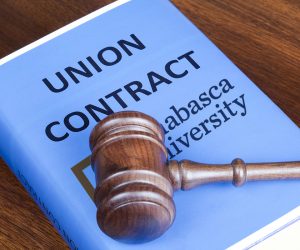 The AUFA bargaining team is reporting that a tentative deal has been struck and is recommending it be accepted. If the AUFA members agree, (and it would be unusual if they didn’t) then that means the negotiations are done and contracts have been negotiated, meaning that AU will have avoided a strike.
The AUFA bargaining team is reporting that a tentative deal has been struck and is recommending it be accepted. If the AUFA members agree, (and it would be unusual if they didn’t) then that means the negotiations are done and contracts have been negotiated, meaning that AU will have avoided a strike.
Looking at the AUFA website, it seems that the changes provided after the strike vote weren’t very much, but were apparently enough that the bargaining team felt there was little chance it would gain anything else. In particular, research and study leave, a particularly contentious issue, is still being dissolved (as recommended by the mediator) to be replaced by professional development leave, which will have a maximum of six months available to be accrued.
To many of us, six months paid leave sounds pretty amazing, but in academic circles, sabbaticals are often year long affairs where researchers are expected to go out and perform, well, original research. They’re expected to be using the time to get into the field and be able to do more in depth or original research than would be allowed under the normal constraints of having to teach or develop course materials at the like at the same time. And, of course, they’re generally expected to return with enough new knowledge to be able to create new publications and bring increased prestige to the university.
Regardless, the new deal means that faculty members who have accumulated more than six months of research and study leave will still have that full time respected until they use it up. The previous offer, from my understanding, severely reduced the amount of leave owed to faculty members who had been banking it for a long time. In addition, the new deal allows faculty members to take up to 30 days of leave each year, or accrue a maximum of 21 days each year, up to a maximum of six months worth, for the new professional development leave.
The bottom line of these changes for students mean that faculty member will likely be taking at least nine days beyond vacation every year for “professional development”, since if they don’t take them, they lose them forever. More esoterically, the shift from “research and study” to “professional development” leads me to wonder if the AU board of governors is attempting to move AU more to a strictly teaching university, rather than a research institution. If so, this doesn’t bode well over the long term, as the closer to DeVry we get, the less likely we are to be considered by top academics as a place that they want to hang their hat. This in turn might mean less prestigious graduate programs and hence less valued undergraduate educations. But that’s long term supposition that will take a while to play out – if it does at all.
Meanwhile, in the here and now, what this likely means is that there probably won’t be any strike, so students can probably stop worrying about whether any sort of work stoppage will affect them or not. Also in the here and now, this issue of the Voice Magazine interviews a student living in Edmonton and who is finding her way with her two children and a goal of Counselling once she attains her degrees from AU.
Plus, Women In Fiction returns with a solid read and examination of the character Jess Bhamra from the movie Bend it Like Beckham, where writer Milica Markovic makes some keen observations about how this character broke new ground. And of course we have advice, scholarships, events, ideas, and more from members of the AU community like you. Enjoy the read!
Correction Notice!
I’ve been contacted by some folks at AU who kindly pointed out that I got a couple of my facts wrong about the changes made and what was going on in the negotiations. Notably, the Research And Development Leave I went on about is only being changed to Professional Development for the professional members of the AUFA — the folks in IT, student services, and university relations–for whom professional development makes more sense. In particular, it was pointed out that research and study leave for the academic faculty members remains the same, and thus my suppositions about AU moving to a teaching institution were unfounded. Thank goodness.
As it turns out, one of the best things about being a cynic/pessimist is that, when you’re wrong, it’s usually a good thing.


